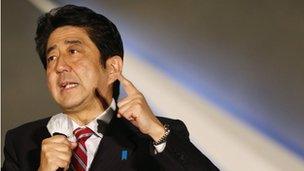Japan election: Shinzo Abe and LDP in sweeping win - exit poll
- Published
- comments

The conservative Liberal Democratic Party (LDP) of Shinzo Abe has won the Japanese election, exit polls predict.
The LDP, which enjoyed almost 50 years of unbroken rule until 2009, is projected to have an overall majority in the new parliament.
Mr Abe has already served a Japan's Prime Minister between 2006 and 2007.
He campaigned on a pledge to end 20 years of economic stagnation and to direct a more assertive foreign policy at a time of tensions with China.
He is seen as a hawkish, right-of-centre leader whose previous term in office ended ignominiously amid falling popularity and a resignation on grounds of ill health.
But Japanese media project big gains for his LDP who they say are on course to win between 275 to 310 seats in the 480-member house.
Its ally, the small New Komeito party, looks set to win about 30 seats to possibly give the alliance a two-thirds majority in the lower house.
That would give Mr Abe the power to over-rule parliament's upper house and help to break a deadlock that some say has plagued the world's third biggest economy since 2007.
The BBC's Rupert Wingfield Hayes says as many predicted, Japan has taken a sharp turn to the right.
The big losers from the election were the outgoing prime minister Yoshihiko Noda and his Democratic Party (DPJ) which is forecast to win between 55 and 77 seats.
A party spokesman told Japan's NHK television Mr Noda would have to resign over the defeat, in which some of the party's leading figures are projected to have lost their seats.
The DPJ has struggled since coming to power in 2009. Two prime ministers came and went before Mr Noda as the party struggled to deliver amid the economic downturn and 11 March 2011 earthquake and tsunami.
Mr Noda lost over his move to double sales tax, something he said was necessary to tackle Japan's massive debt.
'Abenomics'
By contrast, Mr Abe has promised more public spending, looser monetary policy, and to allow nuclear energy a role to play in resource-poor Japan's future despite last year's nuclear disaster at Fukushima.
But economists say there is little new in Mr Abe's policies, or 'Abenomics' as they have been called. They have been adopted by previous LDP governments without successfully renewing the Japanese economy.
Mr Abe has also called for a tough stance on a territorial row with China over islands in the East China Sea that both countries claim.
But neither of the main parties fully convinced voters. Several new parties contested the poll and the right-leaning Japan Restoration Party founded by the mayor of Osaka, Toru Hashimoto. could win as many as 50 seats.
And the nationalist former governor of Tokyo governor, Shintaro Ishihara, whose bid to buy disputed islands provoked a fierce diplomatic showdown with China, may also have won a seat in parliament according to Japanese media.
- Published14 December 2012
- Published13 December 2012
- Published23 October 2017
- Published14 December 2012
- Published26 September 2012
- Published14 December 2012
- Published16 November 2012
- Published26 June 2012